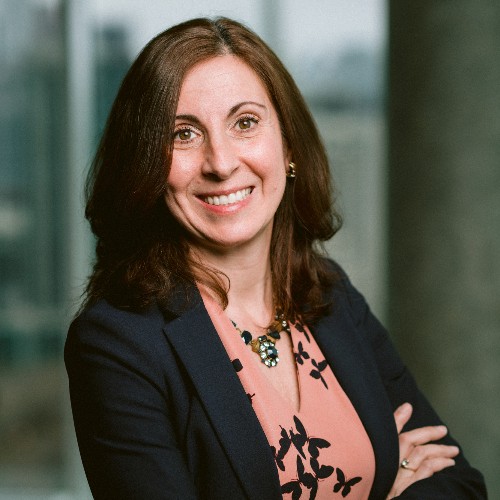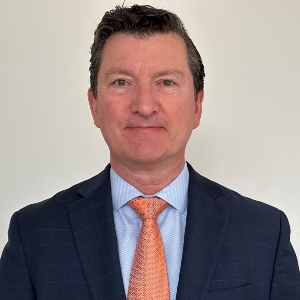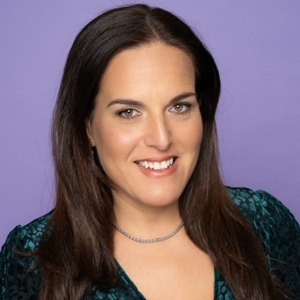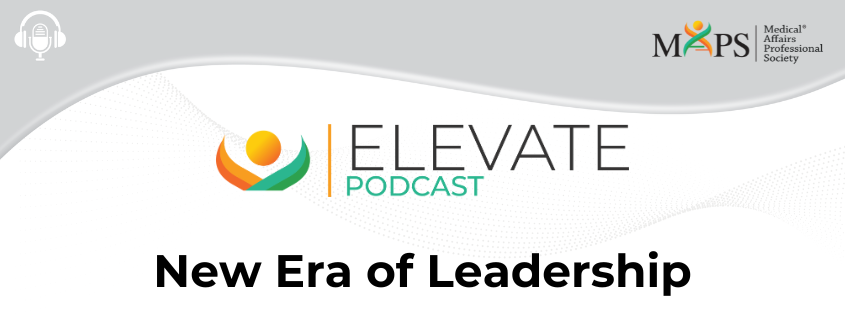In today’s rapidly evolving healthcare landscape, leadership in the pharmaceutical industry is entering a new era—one defined by innovation, agility, and purpose-driven impact. This transformation is especially visible in Medical Affairs, where the role is shifting from traditional scientific support to becoming a strategic driver of patient-centered value, cross-functional collaboration, and real-world evidence generation. In this special series, Bagrat Lalayan sits down with prominent industry leaders to explore how modern leaders are navigating global challenges, embracing digital transformation, and redefining success in a more complex and regulated environment. Together, they’ll discuss the skills, mindsets, and strategies required to lead with vision, foster trust, and accelerate innovation—while keeping patient outcomes at the heart of every decision.

Moderator: Bagrat Lalayan

Speaker: Fran Paradiso-Hardy

Speaker: Matthew John Rice

Speaker: Rinat Ariely

Speaker: Deborah Braccia

Speaker: Stephen Kagan, MD
Following is an automated transcription provided by otter.ai. Please excuse inaccuracies.
Mall 00;00;00;00
MAPS
Oh. Welcome to this episode of the Medical Affairs Professional Society podcast “Elevate”. The views expressed in this recording are those of the individuals, and do not necessarily reflect on the opinions of MAPS or the companies with which they are affiliated. This presentation is for informational purposes only and is not intended as legal or regulatory advice. And now for today’s “Elevate” episode.
00;00;33;09
Bagrat Lalayan
Hi everyone, and welcome to today’s episode for the MAPS podcast. I am Bagrat Lalayan, Head of the Medical Affairs at Legend Biotech, and I’m excited to be joined by a few of my friends and colleagues as we explore a timely and important topic the new era of leadership in Medical Affairs. Over the past few years, Medical Affairs has evolved rapidly, moving beyond its initial supportive work, consulting roles to become a strategic driver of scientific engagement, evidence generation, education, communication, and cross-functional collaboration. With this shift comes a new kind of leadership, one that blends scientific expertise with business acumen, agility, and a deep understanding of the healthcare landscape and therapeutic areas. Today, we’ll be speaking with leaders who are navigating this transformation firsthand. We’ll hear their perspectives on how leadership is changing, what skills are now essential, and how they see the future of Medical Affairs taking shape. So let’s dive in. I’m really looking forward to the insights and experiences we are about to share. My first question to you, Matthew, how should medical assess leaders balance risk and innovation in the coming era? What specific threats and opportunities deserve the most attention?
00;01;55;27
Matthew John Rice
Thank you. First let me say my name is Matthew John Rice. I’m the global Learning Architect Director at Merck. Also, let me say this. This is my disclaimer—these are my personal views, not the views of my company I work for. Now back to the question: how should leaders in Medical Affairs balance, risk and innovation? According to the World Economic Forum, for the second year in a row, the number one global risk is misinformation and disinformation. Let me repeat that. The number one risks we face is misinformation and disinformation. But with that risk comes an opportunity. And I think there are two that stand out for me. First, the patient. Patients are hungry for knowledge. Look at the surge of wearable technology, from smartphones to fitness trackers to smart rings. And now even the new AirPods. They provide heart rate monitoring. People crave data. If we as an industry, do not meet the hunger with clear, trusted science, our patients are going to turn to social media, where rumors thrive. Our patients are hungry for answers. It’s our duty to feed them with the truth. Second are MSLs. In the 1990s, when I was at MSL, MSL were just an extension of medical information. We responded to questions and provided data over time. Of course, the role evolved and MSL became strategic insight gatherers. But now, in an era of misinformation, it’s time to lean in again. Within the right guardrails, I believe MSL must engage in healthy scientific debate. Publishing and presenting data is not enough. We must engage, clarify, and confront half-truths with evidence. Balancing risk and innovation isn’t about tools or data. It’s about bold conversations. Fighting misinformation head on and feeding the patient’s hunger for truth. When misinformation is the risk. Truth is innovation and patients deserve nothing less.
00;04;08;26
Bagrat Lalayan
Thank you very much, Matthew, for a very, very insightful answer. My next question is to you. What will the next generation of Medical Affairs leaders need to thrive in this digital world?
00;04;20;15
Rinat Ariely
Thanks for the wonderful question. First of all, let me introduce myself. I’m Rinat Ariely, a Senior Director in the Global Medical Affairs department at Teva Pharmaceuticals, and I specialize in health economics and outcomes research. I’m sure we’re all aware, unless you’re living under a rock that technology is expanding rapidly, like Matthew just listed. And we as Medical Affairs leaders need to keep up with it, not only for externally facing audiences who come to expect it, but even for internal uses. So, some of the external users, such as HCPs and patients, are becoming more familiar with podcasts. For example, this webinars’ digital contents like Matthew mentioned to make decisions whether clinical, reimbursement, and even the use of digital tools to capture health care information. We can use artificial intelligence or machine learning, chat bots, gamification, augmented or virtual reality to best tailor our messages to each specific audience type. They all have a different preference to see the data in the way they prefer to see it. Internally, we can use tools like social media listening to understand what our audiences are thinking and what evidence they need. We can use AI to automate everyday tasks such as writing assistants and document drafting, such as emails, writing and language translation, and simplify repetitive and time consuming tasks. AI promises major productivity and accuracy improvements. We can also use systematic literature reviews and meta analysis with AI to screen, extract, and standardize data. I would recommend for anyone who is a leader or working within Medical Affairs to get acquainted with your company’s digital technology and IT groups. And if you don’t have one, to establish a strategy for digital health and how to use digital data moving forward.
00;06;10;12
Bagrat Lalayan
Thank you very much, Rinat. Sales in leads, technology and digital strategy are absolutely needed for transformation. Supports the new era of the leadership in medical office. So, Deborah, from your perspective, how do you approach leading global medical as transformations such as people, processes, data and technology?
00;06;31;20
Deborah Braccia
Well, thank you for the question. I’m Deb Braccia with DVB consulting, and I think about transformation and Medical Affairs. I really look at four pieces, and those are people process data and technology and how they all work together for people. It starts with culture, creating teams that feel empowered, connected a really clear on the purpose, process. I focus on simplifying and standardizing so teams can move quickly but still stay compliant with data. It’s about moving beyond activity counts to real insights that shape strategy. Improve our value. And finally, with technology, I look at tools that actually make our work easier, whether that’s connecting teams globally, capturing insights, or driving patient centric decisions when those four pieces come together. Medical Affairs shifts from being supportive to being a real strategic driver. And at the end of the day, transformation isn’t just about systems or frameworks. It’s about unlocking the full potential of people and data to improve patient lives. That’s what makes our work truly meaningful.
00;07;42;08
Bagrat Lalayan
Thank you, Deb, very much for your comprehensive answer. Stephen, when you reflect on this new era of leadership, what is one critical trait that you feel describes a true inspirational live?
00;07;55;24
Stephen Kagan
Thank you, Bagrat. I am Stephen Kagan and I am currently the Deputy Lead for the Leadership and Management Domain here at MAPS. After a long career in Medical Affairs at Pfizer, most recently leading professional development and leadership training. For me, there are many characteristics, of course, that a great leader needs to have, including skills, general skills, a great vision, an ability to communicate. And several, of course, several other traits. But but for me, I’d like to talk about commitment. When you look at the definition of commitment, it talks about being bound to a course of action, but it also talks about being bound to another person or persons. So for me, commitment has to do with serving and serving with sincerity and a very focused purpose. And and who are we serving as leaders in Medical Affairs? Most importantly, we’re serving patients. We want to make sure we’re delivering unmet needs. We have a commitment to serve our colleagues. We need to understand their personal values and their needs and what they need for their own growth and development. We need to understand the needs of our health care colleagues. What what data do they need? What information do they need so that they can make the best decisions along with their patients? We’re committed. Of course, to our business and our companies. And also, importantly, not to forget that we’re committed to ourselves to take care of ourselves so that we can carry out the rest of these duties that I mentioned. A commitment to serve centers around a commitment to listen and understand with empathy. And an example of this, which I love to talk about, was one of my leaders said, write down your commitments. Put it on a slide, show it wherever you go so that others know what Medical Affairs colleagues are committed to, and not only write down what your commitments are for your work, but write down how you’re committed to behave as a Medical Affairs professional. And of course, that goes along with your vision and your mission as well.
00;10;15;16
Bagrat Lalayan
Thank you very much, Stephen, for this excellent description. And the patient centricity is absolutely the priority for all of us. So, Fran, what are the new leadership challenges to your vision in Medical Affairs talent development?
00;10;31;01
Fran Paradiso-Hardy
Thank you, Bagrat. And before I answer the question, I’d like to introduce myself. I am Fran Paradiso-Hardy, Head of Global Medical Communications and Engagement at Astellas Pharma. And I also have the honor and privilege of serving as a leadership and management domain team lead and working with these talented individuals that you’re hearing from today in this podcast. So let’s talk about the the question, what are the new leadership challenges in Medical Affairs talent development. And that’s a really important question, because the way we think about leadership and talent development in Medical Affairs has fundamentally shifted in the past few years. And let’s start with the big picture. According to a 2024 McKinsey report, nearly 60% of pharmaceutical executives say that Medical Affairs is becoming a key strategic driver, not just a supportive function. And that shift has huge implications for the kind of talent we need and how we develop it. Today’s Medical Affairs professionals aren’t just engaging on science. They’re expected to lead in areas like real world evidence generation, digital engagement, health economics. A recent MAPS survey found that 73% Medical Affairs leaders believe new capabilities like data analytics and digital communications are now critical for success, but only 38% feel their teams are currently equipped for those needs. That’s a big gap. And as leaders, one of our biggest challenges is closing this gap. In my humble opinion, it’s no longer enough just to hire or develop for scientific expertise. We need to shape well-rounded professionals who can operate at the intersection of science, data, technology and business. Let’s look at the evolving role of medical science liaisons, for example. As you heard from Matthew, their role has shifted dramatically. Today, we expect them to engage virtually, interpret complex data in real time, provide strategic insights back to the organization, build relationships with a wider range of stakeholders both internally and externally, and tailor content across various channels. That’s a big leap from the traditional MSL role of scientific exchange from many years ago. And this means that as leaders, we have to invest in capabilities like data literacy, digital fluency and communication, not just scientific depth. So the challenge isn’t just capability building, it’s reskilling for the future and more importantly, doing it fast because things are evolving at an incredible speed. Another key challenge is identifying and developing future leaders within Medical Affairs. Historically, high performing Medical Affairs professionals were promoted into leadership roles based on their scientific expertise. But we all know that leading teams, especially in today’s complex environment, requires an and an entirely different skill set, such as having emotional intelligence, cross-functional leadership, strategic thinking, as well as the ability to inspire and manage change. Yet, how research shows that less than 35% of organizations have structured leadership development programs in place for their Medical Affairs teams. And that’s a real risk, because we can’t assume the great individual contributors will naturally become great leaders. Medical Affairs needs to be much more intentional about building leadership pipelines. That includes formal mentorship programs, leadership training, and creating opportunities for emerging leaders to take on these cross-functional projects or international assignments. It’s really about giving people the chance to grow before they’re in the role and not expecting that they grow after they’ve been placed in a role. And let’s not forget about the complexity of leading global and hybrid teams. We know that Medical Affairs functions are often distributed across regions in different time zones, and many roles today are hybrid or fully remote. This means we need to be far more proactive as leaders when it comes to building culture, maintaining engagement, and ensuring that everyone feels seen and heard regardless of where they sit. We’re also dealing with a changing workforce, and this is becoming even more critical when we think about retention and career development. Medical Affairs professionals, especially early to mid-career, are increasingly looking for organizations that invest in their growth. In addition, Gen Z, which makes about 27% of the global workforce today, values development, flexibility and purpose. We consistently are seeing reports that employees do not feel that their skills are being developed and as such, are more likely to leave. So if we’re not building a Medical Affairs culture that supports personalized career development pathways, continuous learning and meaningful work, we’re really at risk of losing great talent to those companies that do so. Lastly, we can’t ignore the role of artificial intelligence and digital transformation tools like natural language processing. Machine learning. Digital insights platforms are starting to shape and reshape how we work. From medical writing to insights generation. According to a BCG report that I just read, AI technology could automate up to 30% of routine Medical Affairs tasks by 23, creating a new layer of complexity for Medical Affairs leaders. So we need to help our teams adapt. Stay future ready. And more importantly, view these tools as enablers rather than threats, not just by upskilling them on technology, but we also need to cultivate adaptive thinking, critical reasoning. And once again, the ability to manage change. That also means that we, as leaders need to be learners ourselves. We have to model this adaptability, curiosity, and openness to change because our teams are watching. Talent development isn’t just about training programs. It’s about creating a culture where people are supported to grow, experiment, and continuously evolve. So in summary, the new leadership challenge in Medical Affairs, talent development is about preparing for complexity. And this really comes down to how do we develop people for roles that didn’t exist five years ago in an environment that is constantly evolving? Increasingly data driven, digitally enabled and globally distributed.
00;17;32;29
Bagrat Lalayan
Run? Thank you so much for this excellent overview of the leadership challenges in Medical Affairs, as well as talent development. And as we sum up this episode, I want to thank each of my colleagues, Matthew Reynolds. They have Stephen and Frank for sharing such valuable perspectives on leadership in Medical Affairs truly means in this new era. From the conversation, it’s clear that the passport requires a careful balance as we ERT. Balancing risk and innovation is no longer optional. It’s essential for staying relevant to the rapidly evolving health care environment. Leaders must be bold enough to challenge the status quo while staying grounded in science, ethics, salvation, impact. The message is clear the future of medical ethics. Leadership is dynamic, digital and deeply human. Thanks again to our guests and to all of you listening. We hope today’s discussion sparks new ideas and conversations in your own teams. Until next time.



